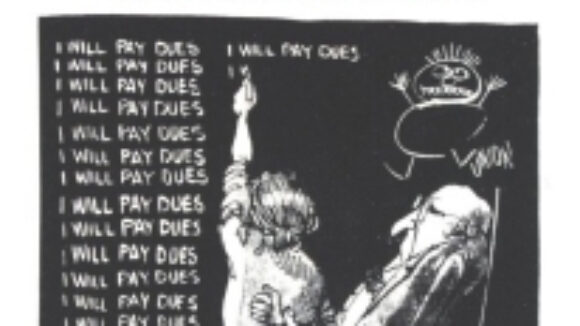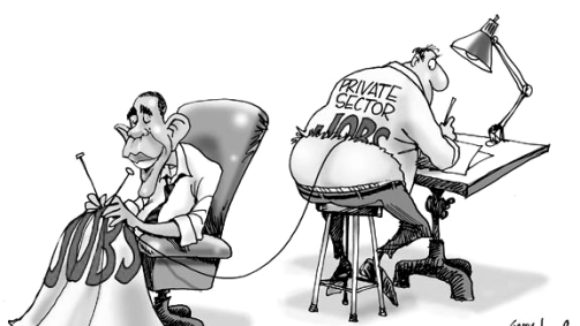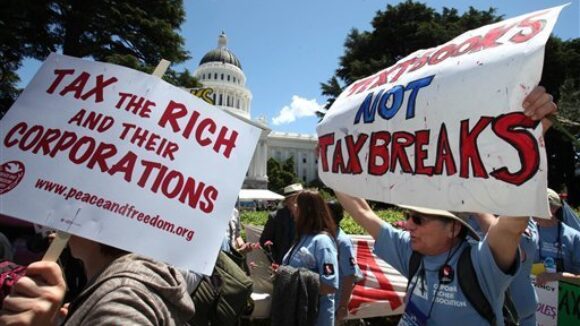
Union Monopoly Rules
Thanks to union rules, California’s “Teacher of the Year” now has another title — “unemployed”: A California woman who was named her school district’s “Teacher of the Year” has a new title — “job seeker.” The district laid off…
Pensions are America's Ticking Time Bomb
You know the union bosses' spending and benefits orgy is coming to an end when liberals like Fareed Zakaria of Time Magazine recognize the dangers unfunded pensions that union activists and pro-big labor politicians have created: "A day after Governor Scott Walker won his recall election, the New York Times wrote, "The biggest political lesson from Wisconsin may be that the overwhelming dominance of money on the Republican side will continue to haunt Democrats." Democrats have drawn much the same conclusion. "You've got a handful of self-interested billionaires who are trying to leverage their money across the country," said David Axelrod, Barack Obama's senior campaign strategist. "Does that concern me? Of course that concerns me." Warren Buffett calls the costs of public-sector retirees a "time bomb." They are the single biggest threat to the U.S.'s fiscal health. If the U.S. is going to face a Greek-style crisis, it will not be at the federal level but rather with state and local governments. The numbers are staggering. In California, total pension liabilities--the money the state is legally required to pay its public-sector retirees--are 30 times its annual budget deficit. Annual pension costs rose by 2,000% from 1999 to 2009. In Illinois, they are already 15% of general revenue and growing. Ohio's pension liabilities are now 35% of the state's entire GDP.
Pensions are America's Ticking Time Bomb
You know the union bosses' spending and benefits orgy is coming to an end when liberals like Fareed Zakaria of Time Magazine recognize the dangers unfunded pensions that union activists and pro-big labor politicians have created: "A day after Governor Scott Walker won his recall election, the New York Times wrote, "The biggest political lesson from Wisconsin may be that the overwhelming dominance of money on the Republican side will continue to haunt Democrats." Democrats have drawn much the same conclusion. "You've got a handful of self-interested billionaires who are trying to leverage their money across the country," said David Axelrod, Barack Obama's senior campaign strategist. "Does that concern me? Of course that concerns me." Warren Buffett calls the costs of public-sector retirees a "time bomb." They are the single biggest threat to the U.S.'s fiscal health. If the U.S. is going to face a Greek-style crisis, it will not be at the federal level but rather with state and local governments. The numbers are staggering. In California, total pension liabilities--the money the state is legally required to pay its public-sector retirees--are 30 times its annual budget deficit. Annual pension costs rose by 2,000% from 1999 to 2009. In Illinois, they are already 15% of general revenue and growing. Ohio's pension liabilities are now 35% of the state's entire GDP.

On the Waterfront: Northwest Ports Slowed Over Inter-Big Labor Squabble Over 2 Jobs
Times must be tough. An escalating dispute between two unions ties up millions of dollars of freight across the Northwest boils down to a spat over just two waterfront jobs, The Oregonian is reporting. Bill Wyatt said Longshoremen staging a slowdown…

NRTW Lawyers Win Big at Supreme Court; SEIU & Big Labor Lose Another Forced Politics Scheme
National Right To Work Legal Defense Foundation attorneys lead by W. James Young fought to stop SEIU abuses of Dianne Knox and her fellow employees right not to be compelled to "subsidize a [SEIU] political effort designed to restrict their own rights." The U.S. Supreme Court 7-2 Opinion written by Justice Alito sets back another Big Labor easy political money scheme right before the 2012 elections. This decision should lead to new challenges to Big Labor's compulsory actions in the future. Two of the Justices, Breyer and Kagan, who opposed the right of individuals to voluntarily spend their own money on politics in the Citizen United case, both supported the notation that unions could compel people to unwillingly support politics that they oppose. From the Opinion: .... When a State establishes an “agency shop” that ex- acts compulsory union fees as a condition of public employment, “[t]he dissenting employee is forced to support financially an organization with whose principles and demands he may disagree.” Ellis, 466 U. S., at 455. Because a public-sector union takes many positions during collective bargaining that have powerful political and civic consequences, see Tr. of Oral Arg. 48–49, the compulsory fees constitute a form of compelled speech and association that imposes a “significant impingement on First Amendment rights.”

NRTW Lawyers Win Big at Supreme Court; SEIU & Big Labor Lose Another Forced Politics Scheme
National Right To Work Legal Defense Foundation attorneys lead by W. James Young fought to stop SEIU abuses of Dianne Knox and her fellow employees right not to be compelled to "subsidize a [SEIU] political effort designed to restrict their own rights." The U.S. Supreme Court 7-2 Opinion written by Justice Alito sets back another Big Labor easy political money scheme right before the 2012 elections. This decision should lead to new challenges to Big Labor's compulsory actions in the future. Two of the Justices, Breyer and Kagan, who opposed the right of individuals to voluntarily spend their own money on politics in the Citizen United case, both supported the notation that unions could compel people to unwillingly support politics that they oppose. From the Opinion: .... When a State establishes an “agency shop” that ex- acts compulsory union fees as a condition of public employment, “[t]he dissenting employee is forced to support financially an organization with whose principles and demands he may disagree.” Ellis, 466 U. S., at 455. Because a public-sector union takes many positions during collective bargaining that have powerful political and civic consequences, see Tr. of Oral Arg. 48–49, the compulsory fees constitute a form of compelled speech and association that imposes a “significant impingement on First Amendment rights.”

Big Labor Wall Crumbling in California?
California is a long ways off from becoming a Right to Work state as the union bosses hold incredible sway over elected officials throughout the state. But Forbes' Joel Kotkin argues a new reform wind is blowing that threatens the old way of doing business: As with the old party bosses in Russia, [Jerry] Brown’s distinct lack of courage has only worsened California’s lurch toward fiscal and economic disaster. Yet as the budget woes worsen, other Californians, including some Democrats, are beginning to recognize the need for perestroika in the Golden State. This was most evident in the overwhelming vote last week in two key cities, San Diego and San Jose, to reform public employee pensions, a huge reversal after decades of ever more expansive public union power in the state. California’s “progressive” approach has been enshrined in what is essentially a one-party state that is almost Soviet in its rigidity and inability to adapt to changing conditions. With conservatives, most businesses and taxpayer advocates marginalized, California politics has become the plaything of three powerful interest groups: public-sector unions, the Bay Area/Silicon Valley elite and the greens. Their agendas, largely unrestrained by serious opposition, have brought this great state to its knees. California’s ruling troika has been melded by a combination of self-interest and a common ideology. Their ruling tenets center on support for an ever more intrusive, and expensive, state apparatus; the need to turn California into an Ecotopian green state; and a shared belief that the “genius” of Silicon Valley can pay for all of this. Now this world view is foundering on the rocks of economic reality. Californians suffer from a combination of high taxes and intrusive regulation coupled with a miserable education system — the state’s students now rank 47th in science achievement — and a rapidly deteriorating infrastructure.

Big Labor's Watershed Moment
Edward Morrisey looks at the impact of recent victories in Wisconsin and Indiana arguing that this signals a watershed moment for reform: Have we reached a watershed moment for the labor movement? Earlier this year, Indiana became the first Rust Belt state to enact right-to-work laws. Arizona made their already-restrictive environment even tougher. And now, after targeting Wisconsin Governor Scott Walker and other republican lawmakers for more than a year, the labor movement has come up empty. In Wisconsin, Walker’s reforms of public-sector collective bargaining were at issue. Democrats nationwide allied themselves with the unions in pushing for recall elections, and liberal pundits promised they would stop this encroachment on labor prerogatives and send a lesson to other governors around the nation. In that, at least, they succeeded, but not in the way the unions had hoped. Despite the high-profile campaign waged by the labor movement in Wisconsin -- where unions have a long history of support – Wisconsin voters reaffirmed Walker as their governor. In fact, Walker won 125,000 more votes in the special recall election than he did in 2010, which was known as a wave election for Tea Party conservatives. He bested the same opponent, Milwaukee mayor Tom Barrett, by an even wider margin of seven points rather than the five-point victory 19 months earlier. The results exposed labor’s weakness rather than strength. While it might not encourage other states to take drastic action to reduce the collective bargaining power, the impotence of the unions in what had been the heart of the progressive Midwest certainly won’t convince anyone not to try. Thanks to the millions spent by the unions in a failed attempt at undoing the 2010 election, Big Labor might not have the resources to fight on this scale again, especially with the national election on the horizon. Nor was this the only big loss that unions took on Tuesday night. In California, where public-employee unions have exerted a strong influence on politics for decades, two cities defied the PEUs to pass badly-needed pension reforms. That may